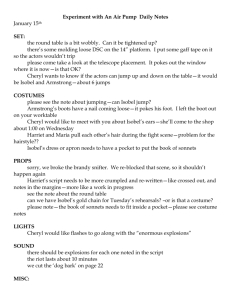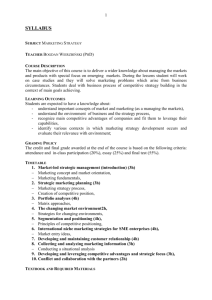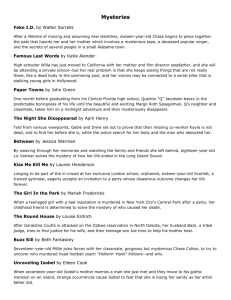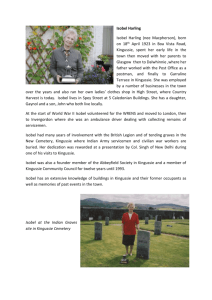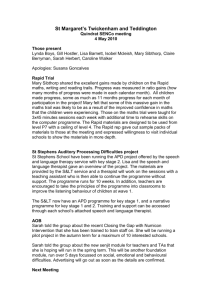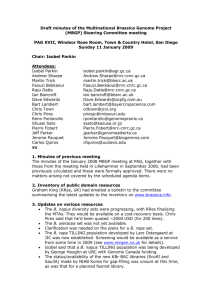I for Isobel - WordPress.com
advertisement
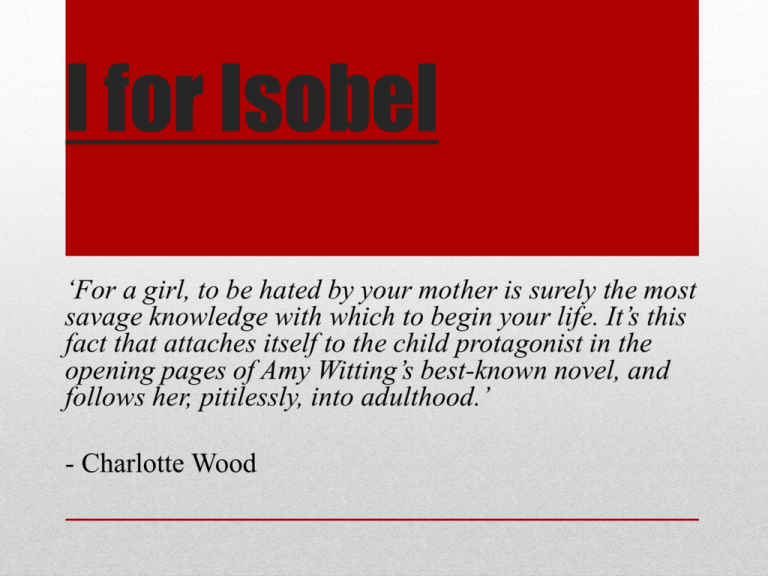
I for Isobel ‘For a girl, to be hated by your mother is surely the most savage knowledge with which to begin your life. It’s this fact that attaches itself to the child protagonist in the opening pages of Amy Witting’s best-known novel, and follows her, pitilessly, into adulthood.’ - Charlotte Wood • Isobel is mistreated by her parents – their summer holiday suggests some wealth, so the fact that they do not buy her a gift, when Margaret always receives one, appears to be particularly cruel. Remember, the issue is not that Isobel does not receive a present, but instead what the lack of present represents – deliberate cruelty, injustice, confusion, and loss of individual identity / self-worth. • It is also in this part that Isobel finds solace in reading, and so begins her escape mechanism – this method may be useful in childhood, but is ultimately creates damaging long-term consequences when Isobel is finally ‘free’ from her parents’ grip. Part One is therefore important because it establishes the strong psychological motivation for Isobel’s reading. 1. The Birthday Present • Reading also gives Isobel praise and a sense of identity / selfesteem. This is something she has never had before. It also gives her some power and control over her mother. • This chapter also provides an insight into the relationship between Isobel and those around her – self-imposed isolation, sympathy for her mother (or her inability to recognise the extent of her abuse), absent father. • Many metaphors and symbols are introduced here, and are extended throughout the novel: the brooch, The Adventures of Sherlock Holmes: A Case of Identity (and thus reading in general), the walls, the writing pad and the coin. 1. The Birthday Present • This chapter also demonstrates that there are people around Isobel who support her, but she fails to acknowledge them – again, this behaviour is established in Part One and extends throughout the novel, suggesting that Isobel is, in some way, responsible for her own unhappiness. The mechanism she used as a child are not effective as a young adult, but she is unable to recognise this and take appropriate action. • Miss Halwood, Caroline & Joanne Mansell, Margaret, Mr. Mansell all support Isobel, but she isolates herself from them. 1. The Birthday Present • What is ‘the birthday present’ and why is the chapter titled this? • Is it the lack of present Isobel receives (the title does not suggest this, though…)? • The gift of reading? – It is, after all, on her birthday that Isobel finds peace and happiness in books. • The kack-coloured insult she receives as a present from her mother? (Reinforcing the need for escape into books). • The brooch from Mr. Mansell? • What ‘present’ actually defines this chapter, so much so that it is titled: ‘The Birthday Present’? You are allowed you own definition here, so long as you can support your opinion. 1. The Birthday Present • John 4:1 – Beloved, do not believe every spirit, but test the spirits to see whether they are from God, for many false prophets have gone out into the world. • It is a sin to worship a false God / a false idol, and therefore, this chapter (and title) suggests that Isobel feels eternally damned because she worships reading and the characters in her books rather than traditional religion. This adds to her sorrows and development of her selfidentity as a sinner. 2. False Idols and a Fireball • Robert and Angelo have become her religion, as Isobel even comments that she no longer speaks to the Virgin Mary, as the characters in her books have taken her place. She feels as though she has committed a mortal sin by worshipping false idols (as represented by Robert and Angelo), and this fear of eternal damnation plagues her. • Isobel resolves to ‘gamble’ and pin all her hopes on a deathbed repentance, although she worries about this, too, because she fears that she will not be able to properly repent or apologise, if she does not know the sin she has committed. 2. False Idols and a Fireball • Isobel looks to others, as young girls do, for guidance in this area but all she feels is admonishment not only from her mother, but from Sister Ignatius who does not help Isobel understand her sins. • This belief is compounded by Sister Ignatius who asks Isobel for the school money, Mrs. Callaghan’s lies about the bracelet and Eileen O’Brien – the only girl to whom Isobel can relate, but who is also a liar (‘…howled the lie that nobody ever believed’). 2. False Idols and a Fireball • By the end of this chapter, Isobel recognises that Mrs. Callaghan is a liar, but no one is willing to confront her deception (not Margaret, Auntie Ann or Isobel – ‘It was important not to break the silence.’) • At this point, she decides that she will celebrate her imagination and creativity, believing that the fireball was real, and that Sister Ignatius will never haunt her again. This is dangerous because Isobel has been made to believe that she can only trust herself, and chooses from this point forward not to allow others to define her reality or ‘truth’. This makes life difficult for Isobel as an adult, because she trusts her belief that everyone dislikes her, when this is not the case at all. • It is important to know that this belief system, like the ‘walls’ and reading, is founded in childhood and extends into adulthood. 2. False Idols and a Fireball • The fireball symbolises Isobel’s creativity and imagination, but rather than being celebrated, it is ultimately used as a tool to mock her intelligence, causing her to believe that she is a ‘hopeless born liar’. • Her creativity and belief in the fireball becomes a ‘well-known joke’ and Mrs. Callaghan uses it to torment Isobel, undermining her natural creativity. Later, Isobel reflects and can see that her mother stifled her potential (‘cruel, deceitful bastards’, ‘semi-strangled body of an infant learning to talk’) and this is an example of HOW she does so. 2. False Idols and a Fireball • Isobel receives the Grace of God in evening Mass. The young priest gives a sermon about insects, cobwebs and the dirty corners of people’s souls – he speaks directly to Isobel. This is important later (p.148: the ‘dirty corner’ of Isobel’s soul is apparent when she is at Michael’s house and she sees the cobwebs in the corner – literary allusion to Great Expectations – and pp.171-172 when Isobel goes back to the church and remembers the priest’s sermon and the power that Grace gave her. 3. The grace of God and the hand-me down. • Grace gives Isobel temporary power over her mother. • Gain an insight into Mrs. Callaghan’s mental health. • Learn that Mr. Callaghan has died, but there is no mention or exploration of his funeral / death. Consider what this implies about his role in the family / Isobel’s life. • Margaret’s alliance with Mrs. Callaghan is broken forever when Margaret stands up to her after learning that her mother had invaded her privacy whilst she was rehearsing for the play. • Margaret confides in Isobel – Isobel has hope that she and Margaret could develop a strong connection. 3. The grace of God and the hand-me down. • Margaret begins spending less time at home and Isobel is ‘left’ with her mother. She feels abandoned and that there is no hope for human connection because Margaret has a new friend, Louise. (Consider whether this means she has actually ‘abandoned’ Isobel.) • Isobel begins researching the lives of the Saints and realises that there is no one ‘right’ way to maintain the state of Grace. She both admires and fears the Saints, but reads about them to learn the ‘rules’ by which she should live in order to be good and gain acceptance. • The one message is: sacrifice. 3. The grace of God and the hand-me down. • Isobel’s Grace is tested when Aunt Noelene brings the handme-downs for both her and Margaret. Aunt Noelene gifts the embroidered yellow dress to Isobel (advocate). The dress comes to symbolise Isobel’s hopes and dreams for the future, her optimism. • The dress is torn by Mrs. Callaghan who finally has the relief of Isobel screaming at her. • By the end of this part, both Margaret and Isobel are completely dejected and desolate, without any hope for future happiness. • Isobel has tried and failed – power, control, happiness, salvation, connection. This influences her perspective when she is an adult and is yet another way in which her childhood is damaging. 3. The grace of God and the hand-me down. • Mrs. Callaghan has died and Isobel feels guilty because she is not upset; in fact, she is relieved. • Isobel and Margaret are separated – Margaret goes with Aunt Yvonne and Isobel is taken under Aunt Noelene’s wing. • Isobel moves into the boarding house, believing now that she can finally be free and happy. 4. Glassware and other breakable items. • Isobel is welcomed into the boarding house (Mrs. Bowers and Mrs. Prendergast). • Literary allusion – Isobel finally has a room of her own but it does not give her the satisfaction she had hoped. • Isobel wants a fresh new start and wants to be Maeve. She thinks the boarders will know she is lying so she does not go through with it. Allusion: The Double, Dostoyevsky. • Isobel is invited to play cards but hopes no one asks her to play – she wants to read. • She is disconnected, believing that everyone was acting in a play. 4. Glassware and other breakable items. • Isobel starts work at Lingard Brothers Importers, translating German. She arrives at work as ‘Maeve’. • Isobel is humiliated by her lack of aptitude on the typewriter – Rita and Olive show her how, but Isobel is embarrassed by their competence. She withdraws and feels closer to the German documents she is translating. • She cannot translate a German word and feels as though she has ‘failed’. She feels like work is just as bad as school – things have not become easier as she had hoped. • The German dictionary is described as a ‘talisman’ – same way she describes the book she steals from Michael. 4. Glassware and other breakable items • Isobel believes Aunt Noelene is helping her not because she is Isobel, but because she is Aunt Noelene. She cannot acknowledge her support and advocacy. • Aunt Noelene tells Isobel she must be a fighter if she wants something from the world. Is she a fighter? Aunt Noelene does not think so (p.73) • Isobel feels more isolated and ‘different’ than ever, and cannot understand why – she had expected life to be simpler; consider why it is not (not just ‘childhood’ but what specifically about her childhood?) 4. Glassware and other breakable items • She feels as though she has offended Mr. Richard and Mr. Walter. Frank is a support – he too is ‘different’ and tells her to be herself, rather than putting on an act. He also encourages her to be a writer and she ignores this advice. • The other boarders begin to dislike Isobel (‘the invisible knife’) – do they? – and she takes comfort in the kitchen where she is a domestic pet. ‘She saw no sympathy anywhere’ – is this true? • Isobel begins to take Madge’s place and looks to Mrs. Bowers as a mother-figure. 4. Glassware and other breakable items • Isobel still cannot find her place at work – she does not know how to react to Rita’s engagement and knows she will not take the opportunity for promotion; the ‘raft’ comes apart and Isobel is swimming again. • Isobel admits that he life goal is to be ‘one of the crowd’ and tells Frank to ‘drop it’ when he encourages her to write. 4. Glassware and other breakable items • Isobel meets the ‘special crowd’ – she is awed by them but initially horrified by the way they judge literature (‘facile Lord Byron’). She feels as though this is a personal attack. • She is jealous of them and their literary games – she wants to exist in that world. • They invite her to join them and she participates in their ‘Parts of Speech’ game (see handout) in which she describes herself as a preposition – a vital component of a sentence and therefore, of society. • The special crowd enable her to feel ‘alive’. They give her hope that there still may be a place she belongs. 4. Glassware and other breakable items • Mrs. Prendergast tells the story of the baby in the baking dish. Isobel cannot explain her reaction or ‘anguish’, but only knows she ‘wanted to run away’, suggesting that she is not yet ready to face the demons of her past. • Isobel is humiliated again when she does not know what Madge’s chant means – she feels inferior to the special crowd even though no one has judged her. • Isobel admits that the special crowd readily accepted her but she will ‘never truly be one of them’. Why? • Isobel comes to resent Madge for standing up to Mrs. Bowers as she wishes she could have done that herself (to her own mother). 4. Glassware and other breakable items • Isobel comes to believe that the other boarders are openly hostile towards her. She cannot understand why they hate her, believing that it is because she is different (11th commandment) – she talks to Joseph, who will never live up to her imagination in real life. • Isobel judges Diana, labeling her a corpse before she’s died; a woman with no self-respect. Interesting – why? • Isobel feels nervous around Trevor and when speaking about books – she wants rules so she does not have to think because when she acts without thinking, she humiliates herself (does she really?) • Isobel realises that the other boarders dislike her because she tried to take Madge’s place – ‘Idiot wants a mother. Idiot can’t have one. Life is very difficult.’ 4. Glassware and other breakable items • Isobel feels responsible when she thinks that Diana may have committed suicide. • She pushes Trevor away when he makes an advance towards her – she believes at this point that her future prospects of being accepted have been destroyed so she removes herself from the special crowd before she becomes like Diana, ‘obsessed with suffering’. • Nick dies in a motorbike accident and Mr. Walter and Olive are extremely kind to her – she does not acknowledge this until p.164. She has had support, but chooses / cannot regonise it. • She wants to comfort Trevor but knows she cannot – she has found herself ‘walled in’. 4. Glassware and other breakable items • Isobel tells Diana that Nick has died and can see herself in Diana’s reaction – relief. She is no longer beholden to her obsession, the same way that Isobel was relieved when her mother died, believing she would be free. • Isobel leaves number Fifty-one, believing that she did not have the right to grieve Nick with the special crowd because she did not belong with them (‘though they had not shut her out’. Who is responsible for her isolation?) • Isobel moves out of the boarding house and into a furnished room. She believes that no matter how hard she tries to be someone different, she will always be resurrected – there is no escape (p.146). • She is ‘never quite alone’ as she has her books. 4. Glassware and other breakable items • The title of the novel – the pronoun ‘I’ suggests she has found a sense of self. It also may imply that she is her own advocate and believes in herself as she, or ‘I’, is for (supports) Isobel. • Consider the extent to which this is true. It is too easy to say that Isobel finds her identity and vanquishes her demons – does she? Also, her becoming a writer does not necessarily mean that she has triumphed as she still struggles in many other aspects of her life. Can 19 years of pain and isolation really be overcome in an afternoon? • She may not be completely aware of her identity, but she has taken the first step, and for her, that is monumental. 5. I for Isobel • Isobel is frustrated by the word factory / the insects. • She still feels isolated – she was humiliated at Kate’s party and ends up going home with Michael. She has onenight stands with men to help her feel connected to the human race, but it is clear that she does not enjoy these encounters. • Isobel uses a book Words of the Saints to protect her nakedness / vulnerability and decides to steal it as it has ‘magical’ powers – ‘I wave this wand.’ 5. I for Isobel • The power of the book is tested when she sees the telephone box and is reminded of her hate-filled anonymous phone calls. This provides an insight into the emotional turmoil Isobel must feel – the book protects her. • She looks at her reflection in the bathroom at Central station and has an epiphany – her face, a curse from her mother, is not just her mother’s; it belongs to all her ancestors. This gives Isobel the freedom to be nineteen and hope for the future, as so many have done before her – she is no longer defined by her mother and realises that ‘she loved the place, the world…’ 5. I for Isobel • Upon returning home, Isobel understands that ‘squalor within demands squalor without’ and begins to clean up her room. • She decides she will make a beautiful embroidery to cover the old peeling wallpaper from the wall. This is a metaphor for her life. • Her embroidery was once a source of pain and humiliation, and was another way in which an adult (Miss Harman) suppressed and stifled her natural creativity. • She realises she can embroider in any colour and pattern, and she finally feels a sense of freedom. 5. I for Isobel • Whilst embroidering, Isobel wonders if religion gives the book its power, and she has a vague memory of being religious once – the ‘scanty cover of time’ has allowed her to forget the pain she felt when her state of grace was destroyed. • She admits once again that books replaced her religion because they offered her more; God is an imaginary friend whilst books give her friendship and company. 5. I for Isobel • Whilst reading Words of the Saints, Isobel realises that Saint John of the Cross’ writings are relevant to her, and so too are those of Saint Thomas More. This is important because she is able to reflect upon death and see that there had been connections and support for her all along (special crowd & Nick, Mr. Walter, Olive etc.) • She also quickly learns that all human beings are united simply because we are all mortal – our mortality unites us, and thus by extension, we all belong, even Isobel. • She decides she needs to go back to the suburb she grew up in to try and find answers about the power of the book. 5. I for Isobel • She develops new tolerance for her younger self who was prevented from using the toilet and wet her pants. • She sees that she was more intelligent than her classmates and that she was being true to herself when she got all the test answers correct – even at this point, she is longing for connection. • Isobel realises that she was never in the wrong – she was never a ‘political animal’, she was a just a child who was twelve-and-a-half bricks high. • She realises that she had been a fool for believing all the lies about her. 5. I for Isobel • She goes back to the church and feels very little, but the pulpit stirs something within her – a memory. • She remembers receiving ‘the Holy Ghost or something’ and realises that it had given her power and control, now understanding the the word Saint on the cover of the book had brought back the calm of the season – it reminded her of the best version of herself; when she was in control of her life. • She is disappointed that religion is the cause of the mysticism, probably because she has already rejected religion, choosing books instead. It is also an obvious answer – she was hoping for something more significant. 5. I for Isobel • She runs into Mrs. Adams and is still afraid of her. She learns that she had never had any need to fear her – Mrs. Adams was pleased that Smoke had been immortalised by her poem, and had bought her a book to encourage her writing, but Mrs. Callaghan rejected the gift. • Isobel remembers that BOTH her parents had threatened libel and slander, and jail. Her father, therefore, was not always ‘absent’ or ‘ineffectual’, he was also guilty of suppressing Isobel’s creativity and imagination. • Isobel breaks down and sobs loudly behind a rock, finally seeing the truth: that her parents had deliberately mistreated her and caused her so much pain in her life. 5. I for Isobel • Mrs. Adams lives three doors from me. She had a cat. Smoke is his name. He curls around the corner silently. When he jumps, his name should be Flame. Blue Certificate to Isobel Callaghan (9 years) • Isobel’s poem is about how appropriate the cat’s name is to its personality, yet it also suggests that the name out to change when the cat changes its behaviour. ‘Smoke’ was true to his name, but he did not only have one fixed identity. Isobel’s childhood poem thus reflects the subject matter of the novel as a whole, circling around the vexed questions of names and identity. 5. I for Isobel • She likens herself to the baby in the baking dish – the baby IS Isobel’s authentic creativity that was smothered by her parents. • Isobel realises that she is a writer – she can choose to be a writer, all it takes is a notepad and a pen (note the symbolism here between the writing pad in Part 1 & Part 5). • Isobel is ‘utterly happy’ as she takes her first step towards a brighter future – she buys a writing pad and begins her first story: The Book is Gone – an ironic title. 5. I for Isobel • Isobel no longer needs books to protect her – she has let down her walls and has felt vulnerable, realising that all the negative portrayals to which she was subjected were lies. • She now has words to carry around with her – she does not need books. She can rely on herself and finally allow the word factory to become a part of her identity. • By the end of the novel, ‘our Isobel’ smiles happily (‘our’ suggesting she has a place to belong at work), and she has ‘met someone’ – herself – as defined by the use of the personal pronoun, ‘I’. 5. I for Isobel 1. The birthday present – Sherlock Holmes, the writing pad, the half-penny, the brooch. 2. The walls – initially offer protection but later causes isolation. 3. Light shining through the church window – grace of God, power and control. 4. The yellow dress – hope for the future, an advocate for Isobel, lost state of grace, desolation. 5. Books – psychological motivation for reading; comfort, acceptance, protection, escape, normality, confidence. Symbolism & metphors 1. Parts of speech game – Isobel is an integral part of a sentence, and is thus a crucial component in society. 2. Settings – her bedroom (a room of her own, later her room reflects the ‘squalor within’), the kitchen (a ‘domestic pet’, church, childhood home / neighbourhood, the summer holiday house. Consider role of women. 3. The word factory – Isobel’s creativity and imagination. Her authentic self; the author within her. 4. Insects – the annoyance Isobel feels at the words and thoughts buzzing around her head – irritated by what she perceives to be causing her difference. 5. The telephone box – emotional disturbance, unresolved issues with her mother. Symbolism & metaphors 1. The writing pad (in Part 5) – a step towards reclaiming control over her life, connecting and awakening her authentic self. 2. The poem about Smoke (see slide 35) 3. Books in Part 5 – she no longer needs them. 4. Her face – a curse from her mother becomes a link to her ancestors and hope for a better future. 5. The baby in the baking dish – Isobel’s stifled creativity and imagination – the smothering of her genuine self. 6. Embroidery & the peeling wallpaper – Isobel’s natural creativity (mocked), hope, overcoming unfulfilling life. Symbolism & metaphors • Mr. Mansell, Margaret, Miss Halwood, Caroline & Joanne Mansell, Auntie Ann, Aunt Noelene, the Priest, (initially) Mrs. Bowers, Madge, the special crowd (particularly Trevor), Olive, Mr. Walter, Frank, Rita, Mrs. Adams. • All these people, in some way, support Isobel. With all these advocates, how isolated is Isobel really? This is an example of when her perspective of reality differs to the facts – a direct result of her self-imposed isolation established in childhood & her need to constantly analyse in order to distinguish between truth and lies (which she struggles to do throughout her journey). Isobel’s advocates • Third-person limited; usually third-person but also insights into Isobel consciousness, which is similar to first-person narrative. • Not typical third-person ‘omniscient’ narrator who can access thoughts and feelings of all characters – the characters in the novel are limited to Isobel’s perspective of them. • The distinction between the narrative voice and Isobel’s voice sometimes disappears. • Sometimes the narrative shifts between first and third, past and present – this allows the narrative to shift between the character’s innermost thoughts and feelings, as well as presenting a more detached, distanced point-of-view (consider why this may be a useful technique in regards to exploring Isobel’s isolation). Narrative voice • The books that Isobel reads give clues as to where she is on her journey. • She has a taste for nineteenth-century novels, which distinguishes her from her peers. • Isobel’s knowledge about life is only gained through books – she is naïve where others are worldly (Caroline Mansell, the special crowd, Aunt Noelene etc.) • Books give her a way to try an understand other people’s motivations and characteristics. • She broadens her reading when she meets the special crowd: Dostoyevsky’s fiction explores the philosophical dilemmas of human existence and human personalities (such as ‘the double self), are all evident in I for Isobel. Literature • Literary allusions: Sherlock Holmes, the Lady of Shalott, Great Expectations, A Room of One’s Own, Alice in Wonderland, Pinocchio, The Double, Crime and Punishment etc. • See handout: literary references in ‘I for Isobel’ for further examples and research. Literature • ‘Rather than the means towards an escape from the world, words become a medium between Isobel and the world, enabling her to take a more confident and assured place within it.’ To what extent do you agree with this statement? Literature • To what extent is Isobel responsible for much of her unhappiness and discontentment? Essay question #1 • “I want to be one of the crowd.” Isobel feels a strong need to belong but does not recognize how to form positive relationships with others. Discuss. Essay question #2 • ‘Whilst readers sympathize with Isobel’s situation in life, we are also frustrated by her unwillingness to be more adaptable.’ Do you agree? This is another ‘to what extent’ question. Essay question #3 • ‘She was by nature timid.’ How does Isobel overcome her shy, timid nature? Essay question #4 • ‘Thou shalt not be different.’ How does Isobel deal with her differences from others? Essay question #5 ‘I am a writer.’ Is Isobel a born writer or do her experiences make her one? Essay question #6 • ‘Selfish and heartless Isobel.’ Isobel is occasionally cruel to other people, but she also wishes to change her ways. Do you agree? This is another ‘to what extent’ question. Essay question #7 • ‘I only want to read books.’ Isobel’s problem is that she reads too much, and experiences too little. Do you agree? This is another ‘to what extent’ question. Essay question #8 • ‘Isobel finds her own identity not by participating in society, but by retreating from it.’ Discuss. Essay question #9 • I for Isobel shows how emotional abuse in childhood causes long-lasting personal and social problems.’ Discuss. Essay question #10 • ‘I for Isobel suggests that books can be both a source of solace and an excuse for avoiding social realities and responsibilities.’ Discuss. Essay question #11 • ‘You will get nothing out of this world unless you fight for it.’ How does I for Isobel bear out the truth of Aunt Noelene’s opinion? Essay question #12 • ‘It was well-established that Isobel was a liar.’ How did Isobel come to believe that she was a liar and what were the consequences? Essay question #13 • I for Isobel explores some of the consequences of negative childhood experiences. Discuss. Essay question #14 • Isobel reflects: ‘This is when I worry, when people dislike me and I don’t know why.’ Do people dislike her or does she misread them? Essay question #15 • ‘I for Isobel suggests that religion may inspire or suppress the human spirit.’ Discuss. Essay question #16 • ‘She did not belong with them, though they had not shut her out.’ How do the students at the Glebe café differ from Isobel? Essay question #17 • Aunt Noelene says: ‘Understand this. You will get nothing out of the world unless you fight for it.’ Is Isobel a fighter? This is another ‘to what extent’ question. Essay question #18 • ‘I for Isobel demonstrates the strength of the will to survive. Discuss. Essay question #19
